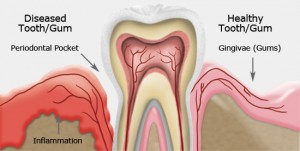If the eyes are the windows to one’s soul and the hair is the crowning glory, the smile is considered as the best make up a person can wear. Yet, how can your beauty truly radiate when you are suffering from gum disease? This kind of disease does not only look awful, it also causes teeth discoloration and bad breath. It fact, it can even lead to a number of serious adverse effects.
What is a gum disease?
Gum disease, also referred to as periodontitis or gingivitis, starts off with the growth of bacteria in the mouth and may conclude with loss of tooth, if not properly taken care of. This is caused by the deterioration of the tissue around the teeth.
Being the mild type of gum disease, gingivitis commonly does not cause severe discomfort. However, it causes the gums to turn red, swell, and bleed quickly. It is usually due to poor dental hygiene. With proper oral care, gingivitis can easily be reversed.
When gingivitis is left untreated, it may progress to periodontal disease. As time passes, oral plaque buildup can spread and develop beneath the gum line. Harmful toxins that are produced by the microbes in plaque aggravate the gums. These toxins generate a persistent inflammatory reaction wherein the body basically triggers itself. The bone and tissue that hold the teeth are damaged. As the ailment advances, the pockets in between the teeth expand, causing more destruction to the gum tissue. This will eventually cause teeth to move around and fall off.
Other issues caused by gum disease
Even though gum disease is located in the mouth, it may also affect other body parts outside the mouth. Here are some risks associated with gum disease:
- Stroke and Heart Disease
Several clinical research suggests that there is a connection between heart problems and gum disease. These studies indicate that the microbes getting into the bloodstream cause the plaque to accumulate and then inflame the coronary arteries. A lot of people who have experienced strokes have been discovered to have gum disease prior to their stroke. Moreover, bacteria in the gums can produce harmful toxins that could damage jaw bones and tooth structures, which give rise to tooth loss.
- Bleeding
- Gum disease can also cause persistent bleeding. This can be very risky, especially to people who are already suffering from blood disorders as it can have side effects on the levels of hemoglobin in the blood.
- Diabetes
Gum disease brings about an inflammatory condition in the body. What most people may not know about is that inflammation has a complex connection to the development of diabetes, particularly Type 2 Diabetes. Additionally, gum disease can affect insulin sensitivity and lead to the rise of blood sugar levels, which makes it even more difficult to control your diabetes.
Gum disease is a problem that should not be taken lightly, and should be given dental attention the moment you notice it. Early intervention stops the problem in its tracks and reverses the effects earlier on.
